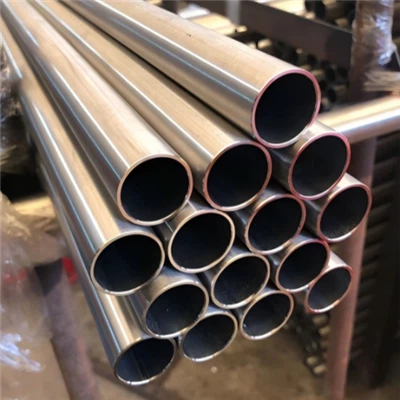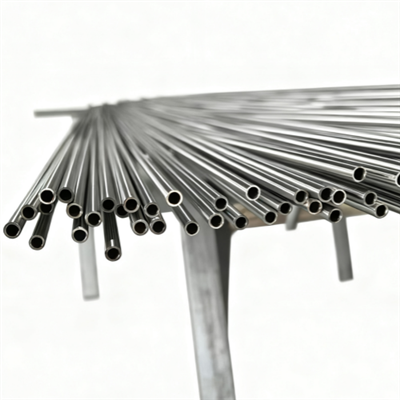Hey there! As a supplier of 316Ti stainless steel pipes, I'm super stoked to share with you all about the mechanical properties of these awesome pipes.
First off, let's talk about what 316Ti stainless steel is. It's an austenitic stainless steel alloy that's a variation of the popular 316 stainless steel. The addition of titanium in 316Ti helps to stabilize the alloy against sensitization during welding and high - temperature applications. This means it can maintain its corrosion - resistant properties even under some pretty tough conditions.
Tensile Strength
One of the key mechanical properties we look at is tensile strength. Tensile strength is the maximum stress that a material can withstand while being stretched or pulled before it breaks. For 316Ti stainless steel pipes, the typical minimum tensile strength is around 515 MPa (megapascals). This is a pretty high value, which means these pipes can handle a significant amount of pulling force without failing.
Imagine you're using these pipes in a construction project where they need to support heavy loads or in a pipeline system where there's a lot of internal pressure. The high tensile strength of 316Ti pipes gives you the confidence that they'll hold up under those demanding situations.
Yield Strength
Yield strength is another important property. It's the stress at which a material begins to deform plastically, meaning it won't return to its original shape after the stress is removed. For 316Ti stainless steel pipes, the minimum yield strength is usually about 205 MPa.
This property is crucial because it helps engineers and designers understand how much stress the pipes can take before they start to permanently change shape. In applications where precise dimensions are critical, like in some high - tech manufacturing processes or in architectural structures, knowing the yield strength of 316Ti pipes allows for accurate planning and ensures that the pipes will perform as expected.
Elongation
Elongation is a measure of how much a material can stretch before it breaks. For 316Ti stainless steel pipes, the minimum elongation is typically around 35%. This high elongation percentage indicates that the pipes are quite ductile.
Ductility is a great feature, especially in situations where the pipes might be subjected to bending or forming operations. For example, if you need to bend the pipes to fit a specific layout in a plumbing system or in a custom - made industrial setup, the high elongation of 316Ti pipes means they can be bent without cracking or breaking easily.
Hardness
Hardness is also an important mechanical property. 316Ti stainless steel pipes have a relatively good hardness. The hardness of a material affects its resistance to wear, abrasion, and indentation.
In environments where the pipes might come into contact with abrasive materials or where there's a risk of physical damage, the hardness of 316Ti pipes helps to protect them. For instance, in mining operations where the pipes are used to transport slurries containing abrasive particles, the hard surface of the 316Ti pipes can withstand the wear and tear better than some softer materials.
Impact Resistance
316Ti stainless steel pipes have decent impact resistance. Impact resistance refers to the ability of a material to absorb energy when it's struck by an object. This property is important in applications where the pipes might be exposed to accidental impacts, like in a busy industrial yard or in a construction site.
If a heavy object accidentally hits a 316Ti pipe, its impact resistance helps to prevent the pipe from cracking or shattering. This reduces the risk of leaks and failures, which can be costly and dangerous in many applications.
Comparison with Other Stainless Steel Pipes
It's always interesting to compare 316Ti stainless steel pipes with other types of stainless steel pipes. For example, SS317L UNS S31703 is another popular stainless steel alloy. While 317L has higher corrosion resistance in some aggressive environments due to its higher molybdenum content, 316Ti has better resistance to sensitization during welding because of the titanium addition.
On the other hand, SS310 UNS S31000 is known for its excellent high - temperature resistance. But 316Ti offers a good balance between corrosion resistance, mechanical properties, and cost - effectiveness, making it a great choice for a wide range of applications.
Applications of 316Ti Stainless Steel Pipes
The mechanical properties of 316Ti stainless steel pipes make them suitable for a variety of applications. In the food and beverage industry, the pipes' corrosion resistance and hygienic properties are essential. They can be used to transport liquids like milk, juices, and beer without contaminating the products.
In the chemical processing industry, the high tensile strength and corrosion resistance of 316Ti pipes make them ideal for handling corrosive chemicals. They can withstand the harsh chemicals and high pressures often found in chemical plants.
In the architecture and construction field, the pipes' aesthetic appeal, along with their mechanical strength, makes them a popular choice for handrails, structural supports, and decorative elements.
Small Diameter Stainless Steel Pipes
If you're looking for Small diameter Stainless Steel Pipes, 316Ti is also a great option. Small diameter pipes made from 316Ti still possess the same excellent mechanical properties as their larger counterparts. They're often used in precision applications, such as in medical devices, instrumentation, and small - scale plumbing systems.


Why Choose Our 316Ti Stainless Steel Pipes
As a supplier, we ensure that our 316Ti stainless steel pipes meet the highest quality standards. We source the raw materials from reliable suppliers and use advanced manufacturing processes to produce pipes with consistent mechanical properties.
Our pipes are thoroughly tested to ensure they meet the specified tensile strength, yield strength, elongation, and other mechanical requirements. We also offer a wide range of sizes and specifications to meet the diverse needs of our customers.
If you're in the market for 316Ti stainless steel pipes, whether it's for a small - scale project or a large - scale industrial application, we'd love to hear from you. Our team of experts can help you choose the right pipes for your specific needs and provide you with all the technical support you require. So, don't hesitate to reach out and start a conversation about your procurement needs.
References
- ASM Handbook Volume 1: Properties and Selection: Irons, Steels, and High - Performance Alloys
- Stainless Steel Handbook by ASM International
So, there you have it! A comprehensive look at the mechanical properties of 316Ti stainless steel pipes. If you have any questions or are interested in purchasing our pipes, feel free to get in touch. We're here to help you make the best choice for your project.






